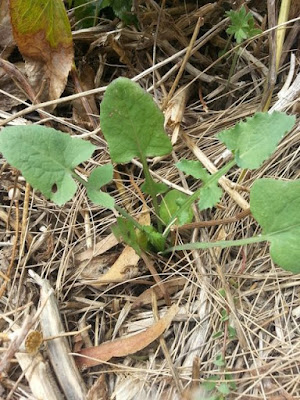After reading a book on the subject, Food Garden Group member Lian raved about eating weeds on the FGG's Food Gardeners Tasmania facebook page. I invited her to write a blog post about eating weeds that commonly occur in Tasmanian gardens. Food for free. Here is what Lian wrote:
A couple of years ago, I read a New York Times article which suggested that most of our domesticated greens were originally bitter, and that in breeding the bitterness out of them, we had also got rid of much of the goodness (see Breeding the Nutrition Out of Our Food ).
I was already aware that certain weeds were said to be high in nutrients, so the above article was enough to send me looking for more information. I eventually found The Weed Forager’s Handbook: a guide to edible and medicinal weeds in Australia by Adam Grubb and Annie Raser-Rowland.
Since then I’ve been trying out all the edible weeds I can get my hands on, and a few firm favourites have emerged. The most unexpected is Fennel pollen.
 |
| Fennel |
Apparently you can collect it by shaking it into a paper bag, and then do all sorts of gourmet things with it, like mixing it with goat cheese. I just wander along, grabbing bits in my fingers and sighing with pleasure. Try it – it’s like a burst of aniseed sunshine in the mouth.
My second favourite is more prosaic, but also more readily available – Sow Thistles
Now that I’ve stopped pulling them out, there are sow thistles in many of the uncultivated parts of my garden, and I eat the young leaves in salads and stir fries. Yes, they’re slightly bitter, but only to a satisfying degree. And according to Dr Rosemary Stanton, a nutritionist from the University of New South Wales, ‘Bitterness is actually quite good … many of the bitter components are actually what we call phytonutrients. Some of them have really important roles in protecting us from various health problems.’
My third favourite is Stinging Nettles, though of course I need gardening gloves to pick them and chop them. But they steam really nicely and are also good in stir fries. Apparently one should eat the young leaves rather than the old ones, which can irritate the kidneys.
Over the last few months I have also tried Chickweed (boring), Purslane (even more boring), Dandelion and Wild Brassicas, as well as Warrigal Greens and Nasturtium leaves, which are on the borderline between weeds and garden plants.
 |
| Chickweed |
They have all become part of my diet to a greater or lesser extent (with the boring ones disappearing into the middle of salads). And I am hoping some Fat Hen (Wild Spinach) will turn up in my garden soon, as I noticed the seeds in the last lot of straw I bought.
If you are interested in weeds, I highly recommend the above-mentioned handbook, which can be bought online.
There is also a Wild Edibles Database at www.db.weedyconnection.com
Please note:
- Don’t pick weeds from the roadside as they have probably been sprayed,
- Make sure that you have got the right plant, and are not about to tuck into a nice bit of hemlock!
 |
| Hemlock is poisonous |
Many thanks Lian, for providing this really interesting insight into what free food there is in our gardens and in the wild.




Guido Mase is an Italian American herbalist with a great scientific and spiritual understanding of the power these wild edibles have to improve our health. He’s an entertaining and inspirational speaker too.
ReplyDeleteListen to the audio files of his presentations at the recent Bionutrient Food Association Conference for free at;
http://bionutrient.org/library/soil-nutrition-conference-archive
Guido is just one of 33 speakers to deliver at this venue. Some great stuff and all available as free audio. Highly recommended browsing.
I just tried the fennel pollen. It's exactly as you describe it, Lian. Thank you.
Gordon, the pollen was an unexpected and really exciting discovery for me. Glad it worked for you too.
ReplyDelete